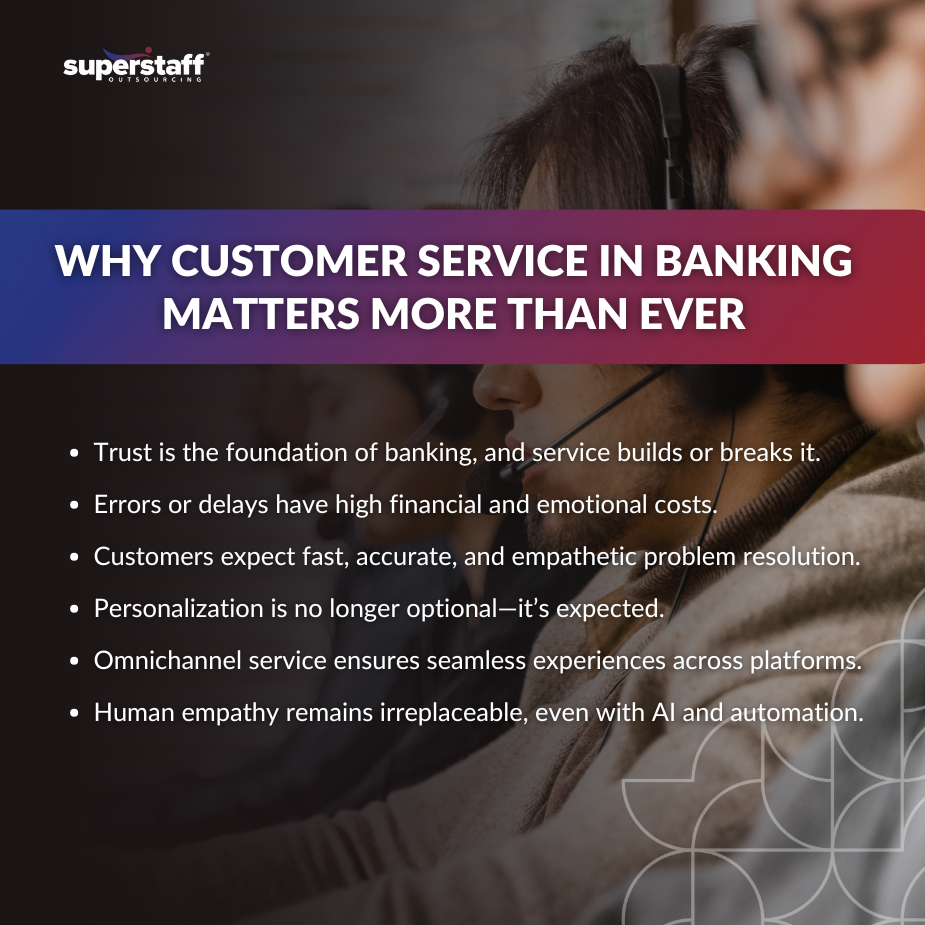
Banking has gone digital, but no matter how advanced the technology, customers still judge institutions by the service they receive. Mobile apps may streamline payments and chatbots may answer simple questions, yet when issues arise, people measure their trust in a bank by how quickly and empathetically it responds.
With fintech competitors reshaping the financial landscape and consumer expectations climbing higher than ever, experience now outweighs convenience alone. Customers expect not just fast transactions but meaningful interactions that make them feel understood and valued. This is why customer service in banking has become a strategic differentiator, directly influencing loyalty and long-term relationships.
In today’s financial sector, customer service is no longer a back-office function; it has become the foundation of trust, retention, and competitiveness. Banks that fail to prioritize the human side of customer interactions risk losing ground to more agile players offering not just services but experiences.
This blog will explore why customer experience matters more than ever in banking, the challenges institutions face in meeting rising expectations, and how outsourcing offers scalable expertise to deliver the level of care customers demand.
Trust is the currency of banking, and customer service is its strongest guarantor.
Trust sits at the heart of every financial relationship. Customers don’t simply deposit money in a bank; they hand over their financial well-being, expecting institutions to safeguard their funds and protect sensitive data. For this reason, customer service in banking is inseparable from trust. A single negative interaction can erode confidence, while consistent, reliable service strengthens loyalty over decades.
Financial institutions operate in an environment where mistakes carry much higher stakes than in other industries. An error in processing a payment or a delay in loan approval isn’t just an inconvenience; it can cause customers financial loss, missed opportunities, or even long-term damage to their credit. Each service interaction must therefore balance speed, accuracy, and empathy to preserve trust.
Demand for Instant Support and Secure Transactions
The importance of fast and accurate problem resolution cannot be overstated. In an era where consumers expect near-instant support, waiting days for a bank to respond is unacceptable. Prompt service demonstrates that institutions value their customers’ time and financial security. A bank that resolves disputes quickly strengthens trust, while slow or dismissive responses signal neglect and weaken the relationship.
Meanwhile, growing concerns around fraud and cybersecurity have made trust even more fragile. Consumers are increasingly wary of scams, phishing attempts, and data breaches. They expect banks not only to secure their accounts but also to proactively communicate when threats arise. Customer service representatives trained to address fraud concerns with clarity and reassurance can mean the difference between a customer who stays and one who switches to a competitor.
In short, trust is built and broken through service. A bank’s ability to protect, reassure, and resolve customer concerns is its most powerful asset.
Building trust through service is just the start; personalization is the next frontier.

Personalization has shifted from a perk to an expectation in banking customer service.
Gone are the days when financial institutions could treat personalization as a luxury reserved for elite clients. Today, personalization is a baseline expectation. Customers want banks to understand their unique financial journeys and provide tailored advice, reminders, and solutions that fit their circumstances.
Customer service in banking now extends beyond answering questions; it requires anticipating needs. Digital apps have set the stage by offering data-driven personalization, such as real-time spending alerts, budgeting tools, or reminders about upcoming payments. These features enhance transparency and help customers feel in control of their finances.
The Role of the Human Touch in Banking Customer Service
Despite the advantages of automation, human agents add the empathy and contextual understanding that algorithms cannot. Here’s an example of how personalization improves banking customer service: A client worried about missing a mortgage payment or struggling with debt may need more than automated tips.
They need reassurance, creative problem-solving, and options explained in a way that builds confidence. Trained representatives can combine data insights with human judgment, delivering truly meaningful support.
Consider personalized fraud alerts. While an app might flag suspicious activity, the follow-up conversation with a human agent determines whether the customer feels protected. If the agent is empathetic, quick to respond, and clear in their explanations, the customer leaves reassured rather than anxious. Similarly, financial guidance delivered by a human, such as suggesting debt restructuring options or tailored loan products, builds trust and demonstrates care.
The lesson is clear: personalization in banking is no longer optional. It is how institutions demonstrate value, strengthen customer relationships, and differentiate themselves from fintech challengers.
Personalization thrives when delivered seamlessly across every channel customers use.
Omnichannel service defines modern banking experiences.
In today’s connected world, customers expect flexibility in how they interact with banks. They want to start a process online, continue it via mobile, and resolve it through chat or a call, without having to repeat themselves at every step. This expectation has made omnichannel service the defining feature of modern customer service in banking.
Integration across call centers, live chat, apps, and physical branches is no longer optional; it is essential. Customers expect continuity, not disjointed experiences. For instance, a client applying for a loan online should be able to call customer service and have the representative instantly access their application details, rather than starting from scratch.
How Outsourced Teams Enable Seamless Omnichannel Support for Banks
Outsourced teams play a critical role in enabling banks to meet these omnichannel demands. BPO providers are equipped with technology and training that ensure consistent service across platforms. They can manage large-scale call center operations, support live chat, and assist with mobile app inquiries, all while maintaining a unified customer record. This reduces friction and enhances the customer experience.
Seamless hand-offs between channels are the hallmark of strong omnichannel service. Imagine a customer reporting fraud via mobile app chat and later following up with a phone call. If the representative already knows the context and next steps, the customer feels valued and respected. If not, frustration sets in, and trust is lost.
Ultimately, creating an omnichannel banking experience is about removing barriers between customers and their financial institutions. It creates an environment where interactions are smooth, efficient, and reassuring: qualities that directly shape brand loyalty.
With omnichannel expectations rising, the human element becomes even more essential.
Despite automation, the human touch remains banking’s biggest differentiator.
The rise of artificial intelligence and automation has transformed the banking industry. Chatbots now handle routine transactions, voice assistants can answer basic queries, and algorithms detect fraud patterns faster than ever before. Yet, while technology has improved efficiency, it cannot replace the human element in customer service in banking.
Customers consistently report that they prefer speaking with a person when dealing with complex or emotionally charged issues. Fraudulent charges, loan denials, or account errors are not just financial matters—they are stressful personal experiences. In these moments, customers need empathy and reassurance that only a human agent can provide.
AI + Human Agents = The Winning CX Strategy for Modern Banks
The hybrid model has become the most effective approach: automation handles repetitive, low-value tasks, while human agents focus on resolving complex or sensitive issues. For example, a chatbot might assist with resetting a password, but a human agent should handle a customer who has been a victim of identity theft. This combination ensures efficiency without sacrificing care.
Outsourced customer service teams trained in empathy, compliance, and industry-specific regulations offer banks a powerful solution. These teams are equipped to navigate both the emotional and technical sides of customer interactions, ensuring that even when automation plays a role, the human touch is never lost.
In the end, technology enhances service, but people define it.
To sustain this balance, banks need scalable and cost-effective solutions.
Outsourcing offers banks the ability to scale customer service without sacrificing quality.
Meeting modern expectations for trust, personalization, omnichannel delivery, and empathy requires significant resources. Many banks, especially mid-sized institutions, struggle to maintain these standards in-house. This is where outsourcing becomes a game-changer for customer service in banking.
Business process outsourcing (BPO) partners provide banks with specialized expertise, compliance knowledge, and multilingual capabilities that are difficult to maintain internally. These partners are experienced in financial regulations, data security, and fraud handling, making them reliable extensions of the bank’s own teams.
The Powerful Advantages of Offshore Customer Service
One of the most significant benefits of outsourcing is cost efficiency. By leveraging offshore and nearshore teams, banks can reduce operating costs while still delivering 24/7 service. Around-the-clock availability is crucial in an industry where financial transactions happen globally and emergencies can strike at any time.
Trained financial support teams also bring depth of knowledge. From handling regulatory compliance inquiries to guiding customers through fraud recovery, these teams deliver both accuracy and empathy. Banks benefit from their ability to scale up during demand spikes, such as tax season, loan application surges, or economic crises, without compromising service quality.
By outsourcing customer service in banking, institutions can balance cost efficiency with high-quality care. The result is a service model that adapts to customer expectations, enhances brand trust, and supports long-term competitiveness.
These advantages prove why experience is (and will remain) the core of banking competitiveness.
Elevate Customer Service in Banking Through SuperStaff’s BPO Solutions
In banking, technology may streamline transactions, but it is customer experience that secures loyalty and trust. Today’s financial institutions cannot rely solely on apps or automation; they must invest in meaningful service interactions that make customers feel protected, understood, and valued.
Trust, personalization, omnichannel service, and human empathy define the gold standard of customer service in banking. Outsourcing empowers institutions to deliver on all four pillars at scale, ensuring they meet modern demands while remaining competitive in an industry that is evolving faster than ever.
Banks ready to stay competitive must invest in experience. Partner with SuperStaff, and outsource to the Philippines today. We’ll help you build a customer service model that delivers trust, care, and confidence in every interaction.






